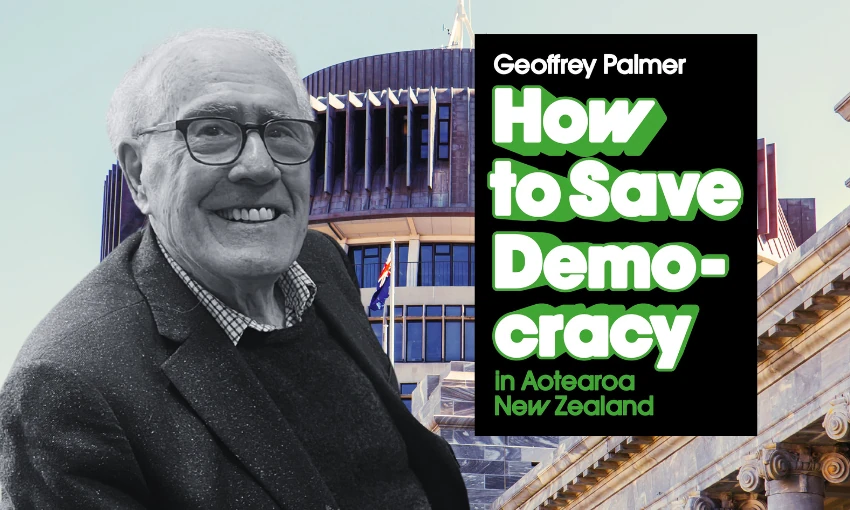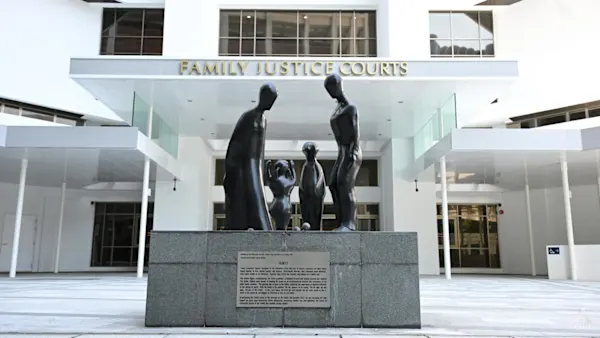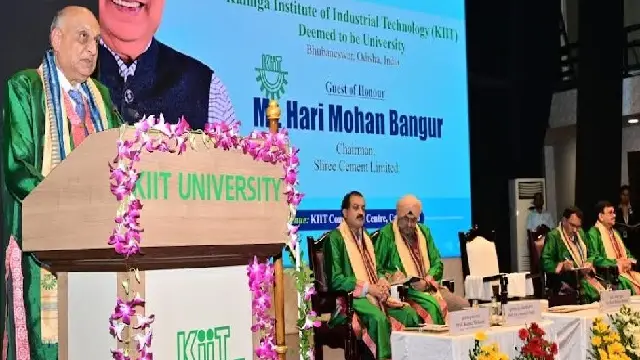By Lyric Waiwiri-Smith
Copyright thespinoff

Instead of being filled with dread by all the flashing signs pointing to the end of democracy as we know it, Geoffrey Palmer has taken the productive route: penning a new book.
From former prime minister Geoffrey Palmer’s window at the Victoria University law school campus in Wellington’s city centre, you can watch the gradual decline of democracy through the window. Opposite his cupboard-sized office are the Beehive and parliament buildings, where in the last few years alone Palmer’s has witnessed governments change hands, countless marches and a weeks-long protest on the parliamentary lawn, where for a moment in time it seemed democracy had totally engulfed itself in flames.
The unrest at home reflects a trend Palmer observes overseas of disgruntled societies, governments moving towards populism and a rise in authoritarianism. So, how does someone who used to have a grip on the helm of the nation, grapple with the idea of seeing our democracy decline? Palmer’s latest work, How to Save Democracy, is a 258-page guide book on just that. It’s a collection of speeches, research and opinion pieces musing on how our democracy and democracies worldwide have gotten to this point, how they get out of it, and what will happen to us if they don’t.
It’s equal parts brainy and anxiety-inducing, but Palmer isn’t the sort who lets himself get tied up in existential dread: it’s more productive to write tens of thousands of words about it all. So, how do we fix this mess? According to Palmer, it can be as easy as introducing civics education in schools, as hard as lowering the voting age to 16 or overhauling the entire damn parliamentary system. In a country with legislators who historically haven’t wanted to mess with how our parliament operates, Palmer knows that the latter will be the hardest sell. Although, if we don’t do something soon, Palmer worries it’ll be too late.
“We don’t change anything,” Palmer moans. “We just leave it alone and drift away without thinking about it. The problem with these things is that democracy doesn’t get lost in a moment, it gets lost gradually. You don’t notice it going away. And if you do, you should do something about it. And [writing a book] is all I can do now that I don’t have any power.”
How to Save Democracy gives substance to a number of democratic issues such as the Treaty of Waitangi and Bill of Rights, while also getting down to the basics of how our parliament operates, and what needs to change. One of the suggestions Palmer offers is for Aotearoa is to increase our number of MPs, which may be a hard sell to the public, but “you can’t expect good service from overworked people”. The last time we set our current number of MPs was in 1996, when the population was at 3.6m people – with a current population of 5.3m, the government has far more New Zealanders to serve, with far fewer resources.
Or, we could try and limit the government’s ability to pass legislation under urgency – a mechanism that allows lawmakers to bypass some of Aotearoa’s key democratic processes, such as the select committee. Palmer reckons the convention simply shouldn’t exist, that use of it by recent governments has been “excessive”, and that a way to patch this up would be by making an amendment to the Constitution Act 1986 so that the Speaker of the House is elected by secret ballot as is done in England, rather than by being nominated by a political party. From there, the Speaker would theoretically have a more partisan view when deciding whether legislation is worthy of urgency.
As a former minister for the environment, Palmer says the “assault” on the natural world through legislation such as the Fast-Track Approvals Bill has been “perpetual and constant”, and the end result of governments worldwide letting environmental issues slip off to the wayside will be “dreadful”. “The environmental catastrophes we are facing through climate change are such that it’ll be a continuous emergency if we’re not very careful,” Palmer says. “You have to remember that if you don’t leave a country with a decision-making system that takes into account the problems of the future before they arise.”
Palmer knows that a lot – if not all – of the changes he suggests in his new work would be a hard pill to swallow for a government that doesn’t particularly enjoy receiving advice, but a former politician has to have hope. Although, if you look at the “10 likely factors of democratic crisis” outlined in Palmer’s work, you could argue our current coalition government is teetering on democratic decay: populist ideals are gaining traction, voter rights are being suppressed, racial prejudice is being appealed to and the gap between the poor and the wealthy continues to widen.
But these problems aren’t just limited to a single government – for example, neither political party has been too keen to tackle the Official Information Act 1982 in a bid to make transparency for the public easier. And though we’re “some distance away” from total democratic decay than other nations, Palmer predicts it won’t be hard for us to reach “civil strife – and when that happens, it’ll be hard to recover”.
It’s all very grim future-thinking. So, hopefully, a sprightly young MP might pick up this book and be inspired to do as their job asks, and make some important changes for the betterment of New Zealand society. “Government isn’t about getting away with it – it’s about making good decisions and producing workable law under which we live peacefully,” Palmer says. “And we don’t search for consensus now, we just ram [legislation] through, and that really affects our sense of social cohesion, and that lies at the root of everything that happens in civil society. If you don’t have faith in your community, then pretty soon you’re disengaged from it.”



